Chai tea may have soothing effects on a sore throat due to its anti-inflammatory and antimicrobial ingredients. The warmth of chai, coupled with honey, can provide a comforting and cough-suppressing effect. While chai can be a soothing home remedy, it’s important to consult with healthcare professionals for severe or persistent sore throat symptoms.
Amidst common home remedies for alleviating a sore throat, chai has emerged as a popular choice. Chai, a traditional Indian tea that combines black tea with a blend of aromatic spices and herbs, is not only cherished for its rich flavor but is also believed to offer various health benefits. When considering the discomfort of a sore throat, the natural ingredients in chai such as ginger, cinnamon, cardamom, and cloves are thought to possess anti-inflammatory and antimicrobial properties, which may help soothe the throat and provide relief.
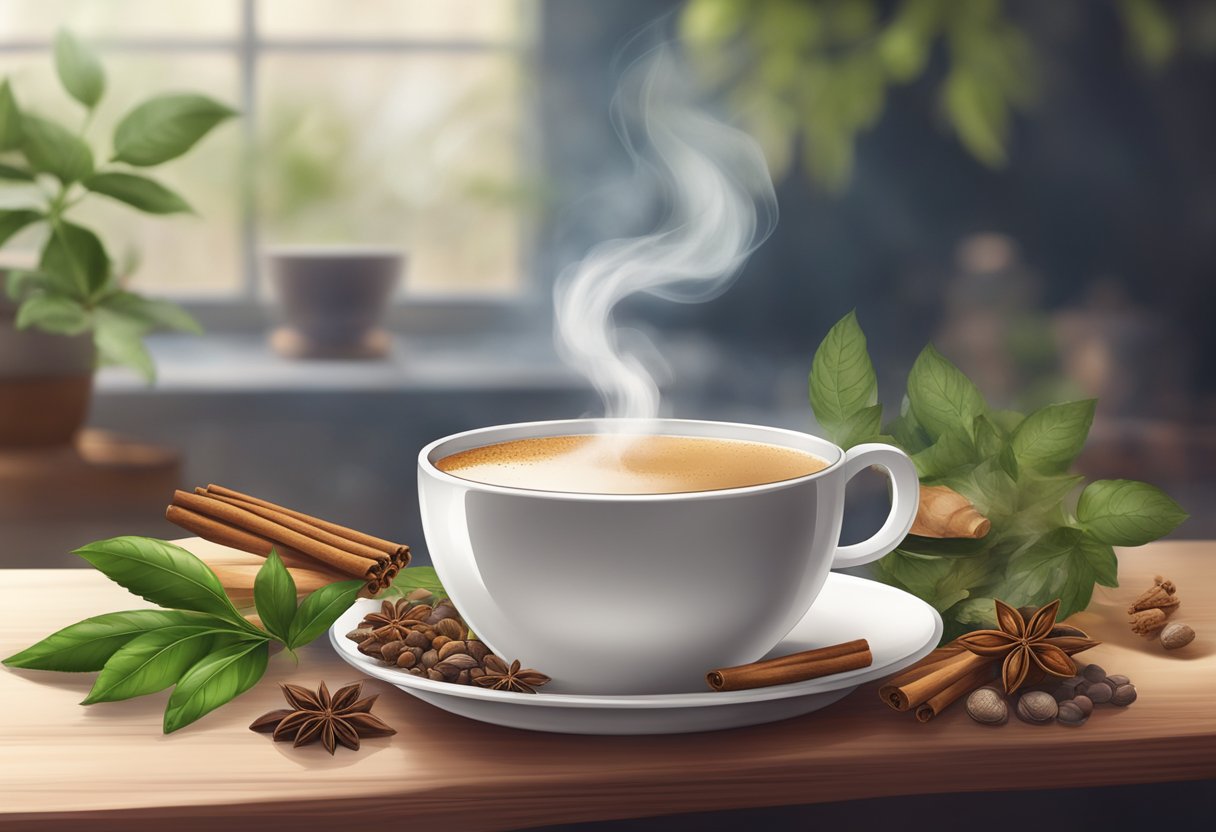
The potential benefits of chai tea in the context of a sore throat center around the polyphenols in black tea and the therapeutic effects of its spices. For individuals suffering from a sore throat, the warmth of a freshly brewed cup of chai can offer a comforting sensation. Additionally, the inclusion of honey, often used to sweeten chai, can act as a natural cough suppressant, further contributing to the relief of sore throat symptoms.
Is Chai Good for Soothing a Sore Throat?

Sore throats are a common condition typically characterized by pain, scratchiness, or irritation of the throat that often worsens when swallowing. Various factors can trigger sore throat symptoms, ranging from infections like the common cold to environmental irritants such as smoke or dry air.
Signs and Symptoms of a Sore Throat:
- Pain or a scratchy sensation
- Difficulty swallowing
- Swollen, red tonsils
- Hoarse voice or difficulty talking
To better understand sore throats, it is helpful to know the primary sore throat symptoms which may also include:
| Symptom | Description |
|---|---|
| Pain | A constant pain or discomfort in the throat. |
| Irritation | An itchy, scratchy, or burning sensation. |
| Swelling | Swollen glands in the neck or jaw area. |
| Hoarseness | A change in voice quality and pitch. |
In addition to these symptoms, individuals might experience coughing, sneezing, runny nose, or fever if the sore throat is part of a broader illness such as a cold or the flu.
Common Causes of a Sore Throat:
- Viral infections: Including the common cold, influenza, or mononucleosis
- Bacterial infections: Such as strep throat caused by Streptococcus pyogenes
- Allergies: Reaction to pollen, dust mites, or pet dander
- Environmental factors: Dry air, pollution, or smoke exposure
- Irritants: Such as alcohol, spicy foods, or acid reflux
An irritated throat often necessitates treatments that may include hydration, throat lozenges, and in certain cases, an evaluation by a healthcare provider if symptoms persist or worsen.
Chai Tea Fundamentals
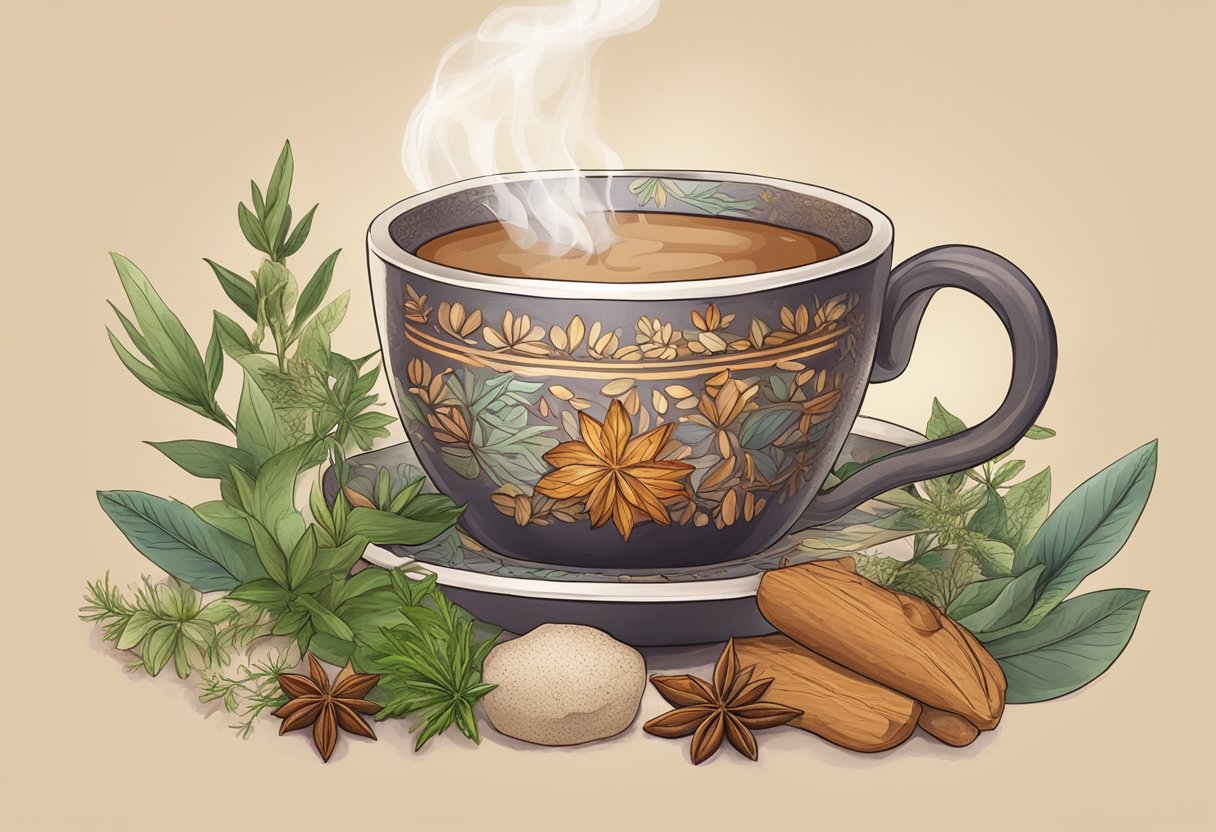
This section addresses the origins and composition of chai tea, providing foundational understanding necessary to evaluate its potential benefits for a sore throat.
What are the Origins of Chai?
Chai originated in India, where it has been a traditional beverage for centuries. Initially concocted for medicinal purposes as part of Ayurvedic tradition, chai tea has evolved into a popular everyday drink, enjoyed for both its flavor and potential health benefits.
What Makes up Chai?
Chai is composed of black tea and a distinctive blend of spices. These spices vary but commonly include:
- Ginger: Known for its anti-inflammatory properties.
- Cinnamon: May have antibacterial effects.
- Cardamom: Can help with digestion issues.
- Cloves: Contain eugenol, which is a natural antiseptic.
- Black pepper: Adds a spicy note and potential digestive benefits.
- Star Anise: Often included for its sweet, licorice-like flavor.
The drink often includes milk and sweeteners, like sugar or honey. Authentic chai spices are believed to contribute to its reputation as a soothing remedy for a sore throat.
Benefits of Chai Ingredients
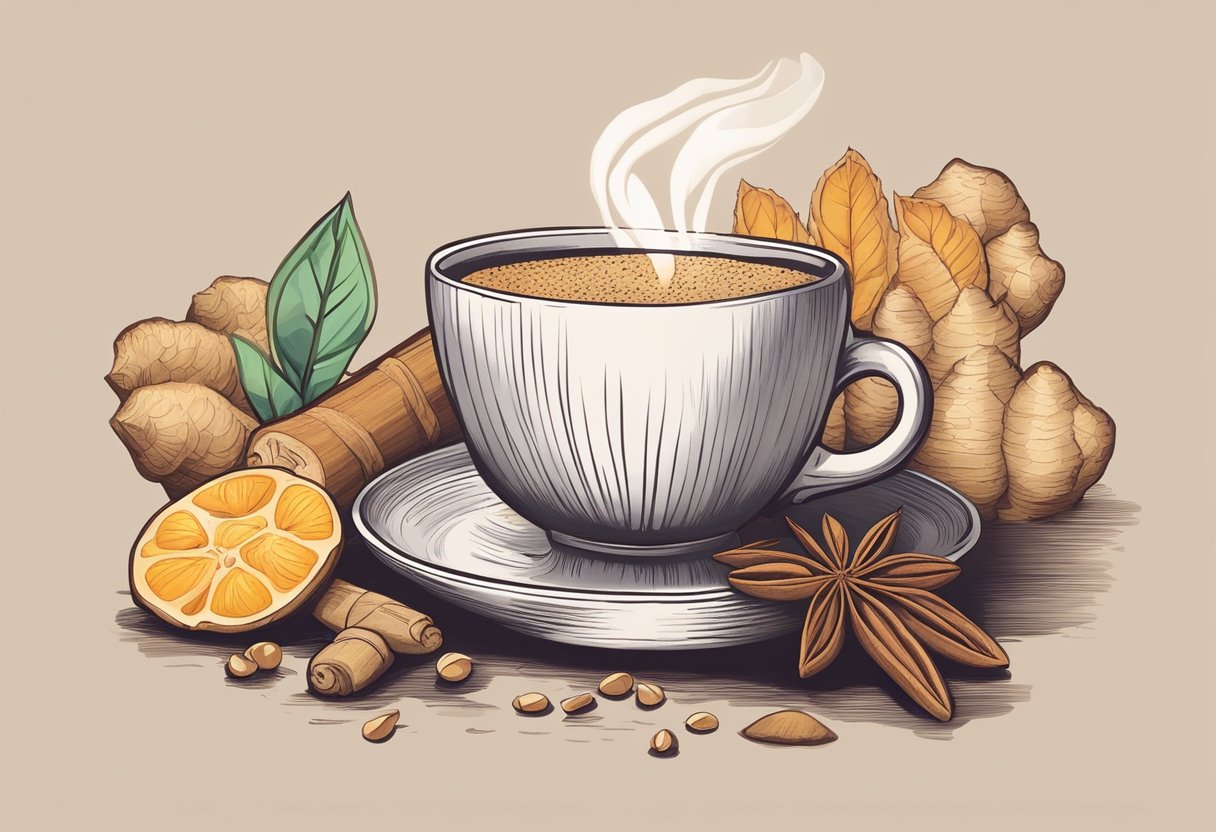
Chai tea incorporates several beneficial ingredients each playing a critical role in providing natural relief for a sore throat.
What Does Ginger Offer to Chai?
Ginger is known for its powerful anti-inflammatory and antioxidant properties. In chai, it contributes to:
- Soothing the throat
- Fighting bacteria that can cause infections
How Does Turmeric Benefit Chai Drinkers?
Turmeric provides significant antioxidant and anti-inflammatory benefits. This spice enhances chai with its:
- Natural cold-fighting ingredients
- Ability to reduce throat inflammation
What Can Cinnamon in Chai Do for Your Throat?
Cinnamon brings antibacterial properties to the mix, helping to reduce soreness. It’s known for:
- Its antioxidant content
- Microbial management to fight throat irritation
What Are the Characteristics of Cardamom in Chai?
Cardamom is another spice in chai known for its anti-inflammatory effects. Its role includes:
- Contributing to the reduction of throat discomfort
- Offering additional antimicrobial benefits
How Does Chai Soothe a Sore Throat?
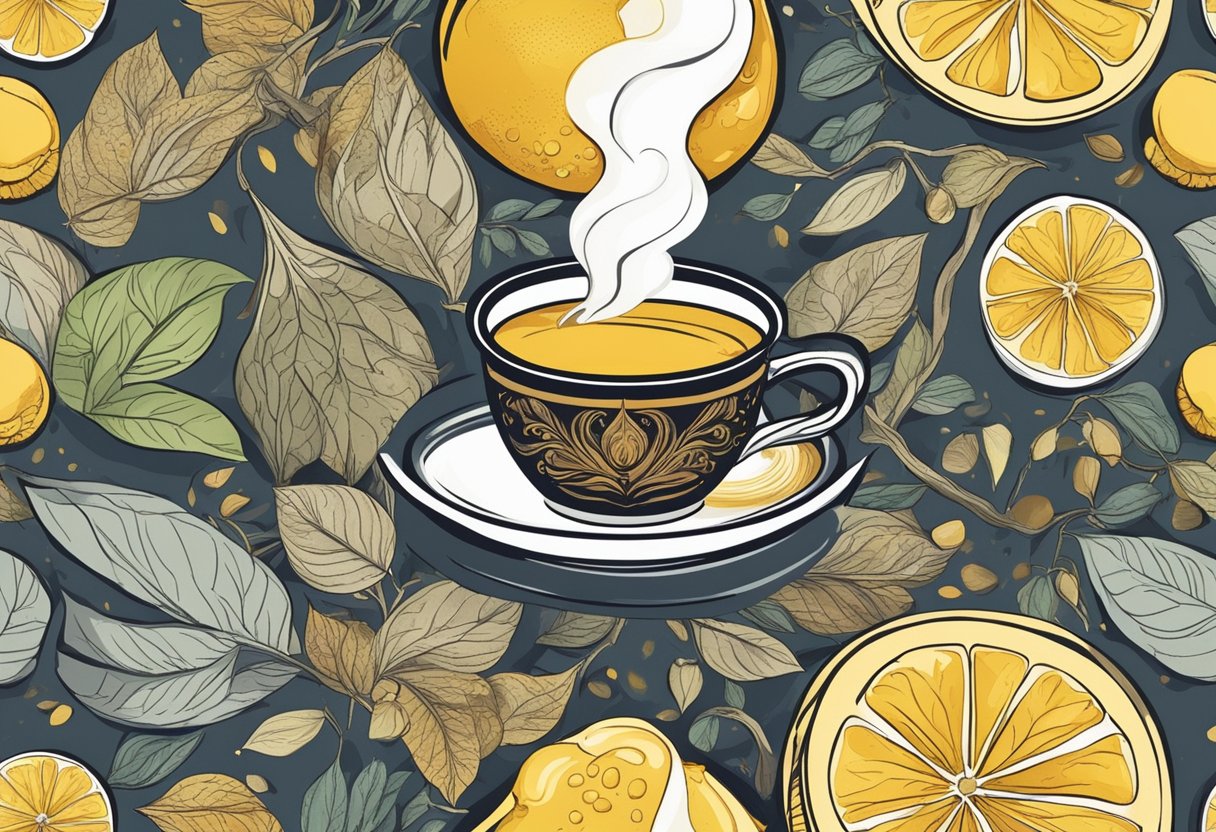
Chai tea, with its blend of natural ingredients, can help soothe a sore throat by reducing inflammation and pain.
Does Licorice Root Aid in Throat Relief?
Yes, Licorice Root can provide significant throat relief.
- Soothing Irritation: Licorice root is often recognized for its therapeutic effects on the throat. Its compounds can help to coat the throat, which diminishes irritation and soothes symptoms.
- Licorice Root Properties:
- Glycyrrhizin: This active ingredient may reduce throat irritation.
- Anti-inflammatory: It can help to lessen swelling in the throat.
Can Cloves Reduce Throat Pain?
Cloves are effective in reducing throat pain.
- Pain Reduction:
- Eugenol: Cloves contain this natural anesthetic, which contributes to pain relief in sore throat cases.
- Antimicrobial effects: Can aid in fighting the underlying infections that often cause sore throats.
Other Teas and Their Effects
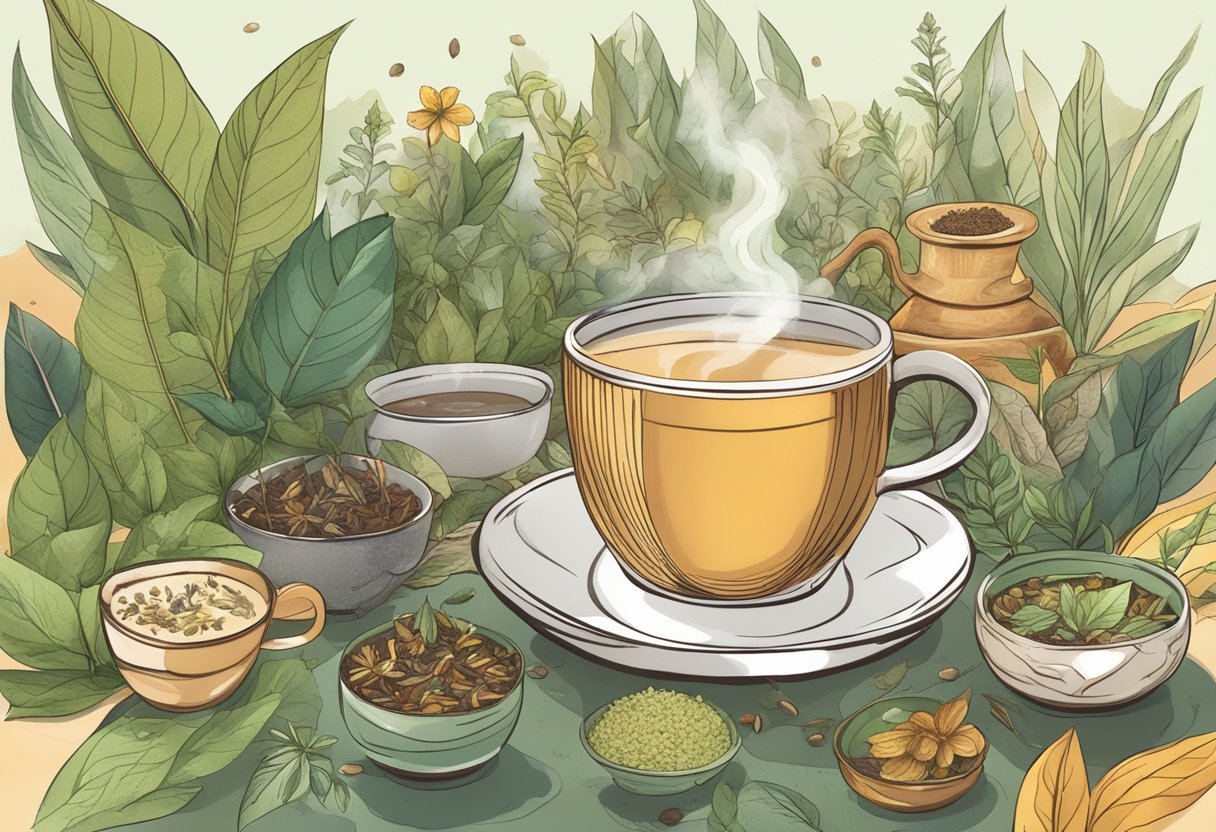
When exploring the relief of sore throats, various types of tea beyond chai can be considered for their therapeutic properties.
Green Tea Attributes
Green tea is recognized for its antioxidants. Specifically, it contains polyphenols like catechins, which have been studied for their anti-inflammatory effects. Regular consumption of green tea could potentially reduce the pain and discomfort associated with sore throats.
| Benefits of Green Tea | Potential Challenges |
|---|---|
| Antibacterial properties | Contains some caffeine |
| Anti-inflammatory effects | |
| Rich in antioxidants (catechins) |
Herbal Teas Variety
Herbal teas offer a wide range of benefits. Many of them are caffeine-free and contain various bioactive ingredients that exert antimicrobial and anti-inflammatory effects.
- Peppermint Tea: Often contains menthol, which can naturally soothe a sore throat and act as a decongestant.
- Licorice Root Tea: Said to coat the throat, providing soothing relief, and has properties that may help reduce irritation.
Chamomile Tea and Relaxation
Chamomile tea is noted for its calming effects. It is naturally caffeine-free and often consumed for its soothing properties, which may help in reducing sore throat pain due to its anti-inflammatory constituents.
- Relaxation: Promotes relaxation, potentially easing body discomfort caused by illness.
- Antibacterial: Certain compounds in chamomile tea may contribute to its antibacterial effects, beneficial when dealing with throat infections.
How Does Tea Contribute to Immunity?
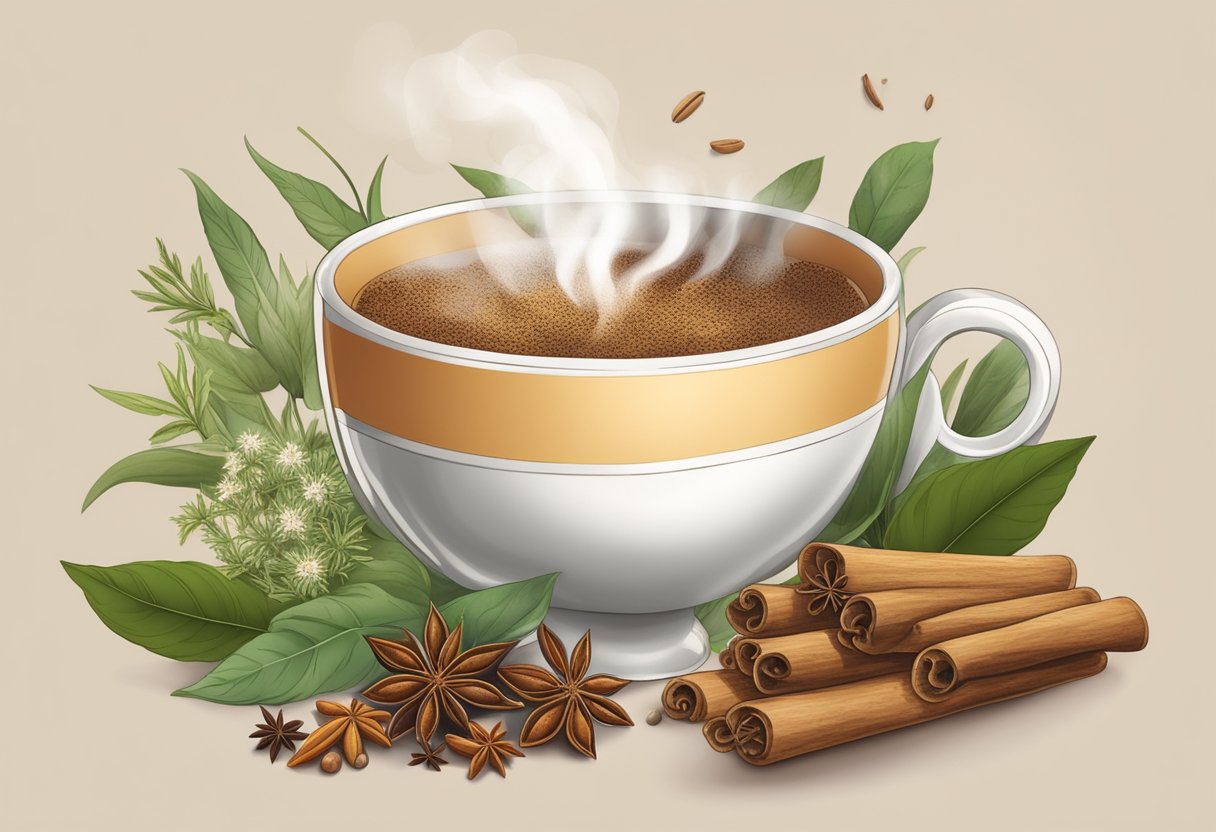
Tea can offer support to the immune system, which may be beneficial during cold and flu season.
Boosting Your Immune System
Tea contains compounds that can bolster the immune system. These include a wealth of antioxidants such as polyphenols and flavonoids that can help support the body’s defense mechanisms. For instance, polyphenols have been observed to have anti-inflammatory and antimicrobial properties, potentially aiding the immune system in fighting infection. Specifically, black tea polyphenols like theaflavins could play a role in enhancing immune function.
- Antioxidants in Tea:
- Polyphenols: Reduce oxidative stress.
- Flavonoids: Strengthen immune response.
Tea and Cold Prevention
Regular consumption of tea might contribute to cold and flu prevention. Tea acts as a natural decongestant, which can ease symptoms of the common cold, potentially reducing the severity and duration of the illness. Additionally, certain herbal teas are infused with natural ingredients like Vitamin C, which is known to promote healing and bolster the immune system.
- Tea Properties for Cold Prevention:
- Natural Decongestant: Eases respiratory symptoms.
- Vitamin C: Enhances healing and immune defense.
Practical Ways to Consume Chai for Relief

Consuming chai for sore throat relief can be both comforting and beneficial due to its combination of spices. This section explores how to prepare chai at home and choose the right chai blends for maximum benefits.
Preparing Chai at Home
To prepare chai at home for relief, one can follow these specific steps:
- Boil water: Start with boiling water in a pot on the stove.
- Add black tea and spices: Add your black tea leaves or bags and a mix of spices such as ginger, cinnamon, and cloves. These spices have anti-inflammatory properties that can soothe a sore throat.
- Simmer: Allow the mixture to simmer so the flavors can infuse the water.
- Strain: Once brewed to the desired strength, strain the tea to remove the solid components.
- Add sweetener or dairy: If desired, add honey, which can coat the throat and provide additional soothing effects. Milk can be added to create a chai tea latte, but it is optional.
Choosing the Right Chai Blends
Choosing the right chai blend involves:
- Considering the ingredients’ quality and potential for providing throat comfort. Look for blends that incorporate ginger or turmeric, known for their anti-inflammatory effects.
- Opting for fenugreek tea can be additionally beneficial due to its mucilage content, which coats and soothes the throat.
- Adding marshmallow root tea to a chai blend could help soothe irritation, thanks to its thick, mucilaginous properties.
| Ingredient | Benefit |
|---|---|
| Ginger | Anti-inflammatory, may help with throat pain |
| Cinnamon | Can serve as an anti-inflammatory |
| Cloves | May help to numb and soothe a sore throat |
| Turmeric | Contains curcumin, which is an anti-inflammatory |
| Fenugreek | Has mucilage which can coat the throat |
| Marshmallow root | Soothes mucous membranes in the throat |
To optimize the soothing effects, one should consume a hot cup of chai fresh from preparation. The warmth is crucial as it adds moisture and comfort to the throat.
Complementary Natural Ingredients
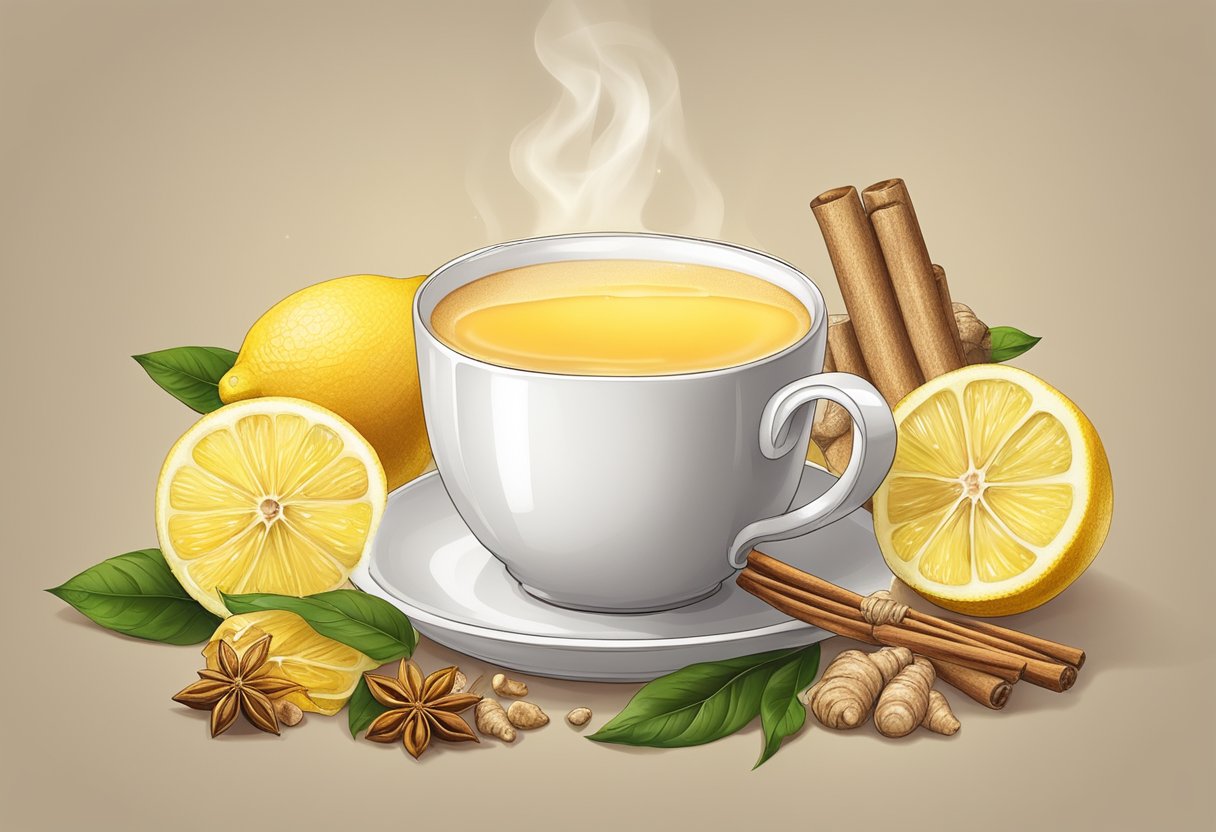
In the context of using chai for a sore throat, certain natural ingredients can complement the healing process by providing anti-inflammatory benefits and essential nutrients.
Honey’s Healing Touch
Honey can soothe a sore throat by its natural wound healing properties and soothing effect. It serves as an excellent complement to chai, as it can further enhance the beverage’s soothing abilities.
Properties of Honey:
- Anti-inflammatory
- Antimicrobial
- Wound healing
Benefits When Added to Chai:
- Helps reduce throat inflammation
- May speed up the healing process
- Enhances taste
Lemon Juice’s Vitamin C
Lemon juice, rich in vitamin C, can support immune function. Adding fresh lemon juice to chai not only provides a hint of refreshing flavor but also contributes to overall well-being, especially when one is experiencing a sore throat.
-
Vitamin C Content:
-
High in fresh lemon juice
-
Contributes to immune defense
Advantages for Sore Throat:
- Can help reduce inflammation
- Encourages hydration with warm liquids
When to Seek Professional Care?

It is essential to know when to seek medical help for a sore throat, especially if symptoms persist despite using home remedies such as chai tea to alleviate discomfort.
Recognizing Persistent Symptoms
When attempting to soothe a sore throat, individuals often opt for home treatments like chai tea, which may provide temporary relief. However, professional care should be considered in the following circumstances:
- Cold symptoms persist: If common cold symptoms, such as a cough or runny nose, continue beyond a week, despite attempts at relief.
- Severity of symptoms: High fever, difficulty swallowing or breathing, or intense, lasting pain should prompt medical evaluation.
- Accompanying symptoms: The presence of a rash, lumps, or swelling in the neck, or any sign of infection, such as pus on the tonsils, indicates the need for a doctor’s visit.
Here is a table to clarify when to seek professional care for a sore throat:
| Symptoms | Action Required |
|---|---|
| Cold symptoms over a week | Consult a healthcare provider |
| Difficulty swallowing | Seek immediate medical attention |
| Breathing difficulties | Seek immediate medical attention |
| Unusually high fever | Consult a healthcare provider |
| Rash or neck swelling | Consult a healthcare provider |
| White spots on tonsils | Consult a healthcare provider |
| Severe or persistent pain | Consult a healthcare provider |
If symptoms suggestive of strep throat are present, such as fever, pain when swallowing, or swollen glands, these should not be ignored, and one should consider visiting a healthcare provider.
Is Chai Good for a Sore Throat?
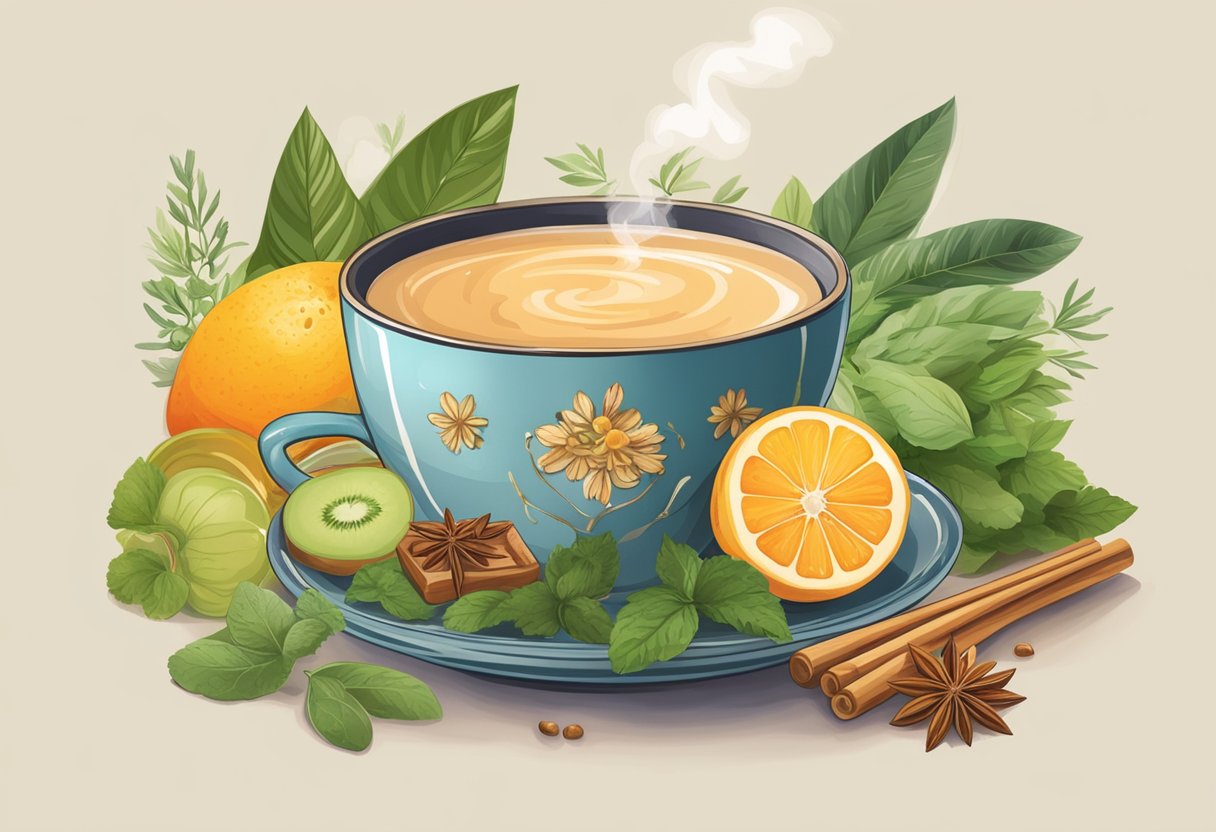
When considering the relationship between lifestyle, diet, and sore throat management, one must recognize that a holistic approach is beneficial. Dietary choices, especially the consumption of soothing and health-promoting beverages like chai, can influence throat health.
The Importance of a Balanced Diet
A balanced diet is vital for maintaining overall health and supporting the body’s ability to fight infections, including those that cause sore throats. The following elements are essential in a diet that supports throat health:
- Antioxidants: Found in various ingredients of chai such as cinnamon and ginger, antioxidants help reduce oxidative stress and inflammation, which can soothe sore throats.
| Nutrient | Sources in Chai |
|---|---|
| Antioxidants | Cinnamon, Ginger |
| Anti-inflammatory agents | Cloves, Black Pepper |
-
Medicinal properties: Many traditional and herbal medicine practices value the medicinal benefits of chai’s components. For instance, cloves contain eugenol which has pain-relieving properties, and black pepper may have immune-supporting effects.
-
Hydration: Fluid intake is crucial when dealing with a sore throat. Although caffeinated teas like Assam black tea may have mild diuretic effects, the liquid in chai can still contribute to overall hydration.
| Aspect | Consideration |
|---|---|
| Hydration | Chai contributes to fluid intake but beware of excess caffeine from Assam black tea. |
-
Slippery elm: While not typically found in traditional chai recipes, slippery elm is a common herbal remedy for sore throats due to its mucilage content. Including it in a diet can complement the benefits of chai.
-
Promoting relaxation: Stress can negatively impact immune function. Ingredients in chai, such as cinnamon and ginger, have properties that may promote relaxation and recovery.
The consumption of chai tea, when integrated into a balanced diet, can offer several health benefits that may alleviate sore throat symptoms. However, it’s important for individuals to listen to their bodies and avoid any ingredients that may exacerbate symptoms or allergies.
Frequently Asked Questions

In this section, we address common inquiries regarding the effectiveness of various types of tea in mitigating the discomfort of a sore throat.
Which type of tea can help alleviate a sore throat and cough?
Ginger and herbal teas are renowned for their soothing properties.
| Tea Type | Benefits |
|---|---|
| Ginger Tea | Anti-inflammatory, can soothe irritation |
| Herbal Tea | May contain ingredients like chamomile or licorice root that offer relief |
Can drinking milk tea improve a sore throat?
Chai, a type of milk tea, may provide relief due to its spice content.
- Chai Tea: Spices like ginger, cinnamon, and cloves have anti-inflammatory properties that can alleviate sore throat pain.
Does green tea offer benefits for a sore throat?
Green tea possesses anti-inflammatory and antioxidant properties that can assist in sore throat relief.
- The compounds in green tea may help reduce inflammation and fight viruses that cause sore throat.
Are there any advantages of consuming matcha for a sore throat?
Matcha contains a high level of antioxidants which can support immune health.
- Its anti-inflammatory properties can help relieve the symptoms of a sore throat.
Is black tea effective in soothing a sore throat?
Black tea may help reduce inflammation and soothe throat discomfort.
- It can be beneficial on its own or with added honey, which is known for its soothing effects.
Can chamomile tea help relieve symptoms of a sore throat?
Chamomile tea is recognized for its natural soothing effects on sore throats.
- The tea’s anti-inflammatory qualities can aid in reducing swelling and discomfort associated with sore throats.
